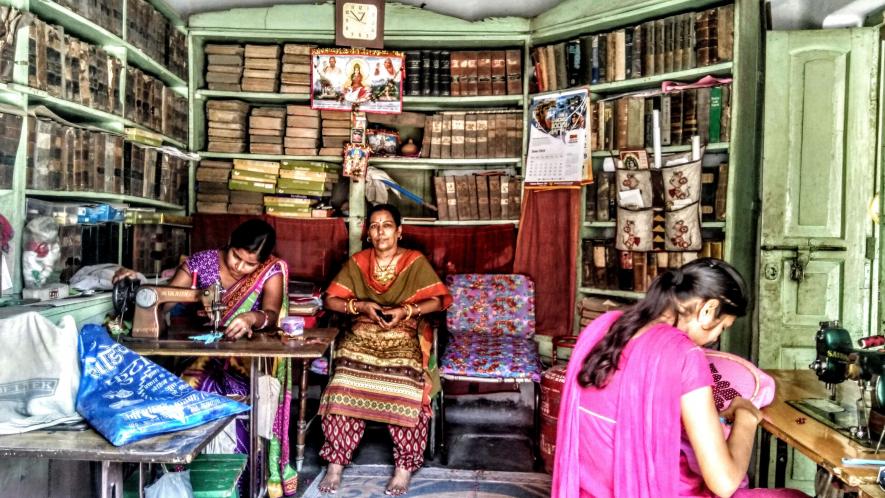Stitching a Future for Women: A Sewing Training Centre in a Hamlet in Bihar

Sunita Verma’s training centre.
“Conservative thinking is still rooted in our society. Women are only expected to do the household chores. Every profession here is dominated by males…but time is changing…this is probably happening for the first time…the number of woman tailors in the town is increasing,” says Pooja Devi, 20. “Even if I am not allowed to earn from this [sewing], I will be able to save some money by stitching my own clothes or window curtains,” she adds.
Pooja was married two years ago. “No one except of my husband is supportive while I am learning this,” she says while explaining the restricted environment in her in-laws’ home. Her in-laws had warned her against learning sewing skills but she was determined. For Pooja, however, the art of sewing is her only means to uplift her situation. She is staying with her parents for a few months, and devoting extra hours to finish training before she travels back to her in-laws’ home in Sikta, 38 kilometres away from her parents’ house in Pathri Ghat locality of Bettiah.
Pooja attends Sunita Verma’s Kritika Silai Bunai Kendra, a sewing training centre in the crowded hamlet of Gulab Baug of Paschim Champaran, northwestern district of Bihar. More than 700 women have been trained so far. Verma has been running this centre since 1990. In 2002, it was affiliated to the District Industries Centre. The centre now runs three batches of four people each- lined for a three month course.
Pooja is learning the art of single needle straight stitching from Sunita Verma, the trainer.
Sunita Verma tells NewsClick that the local people don’t want women to step out of the house. She explains, “If women will start coming out of their homes, their interaction with the world outside will increase. If this happens, these narrow-minded people will face unsurmountable difficulty in pushing women back in chains.”
Also read: Women Madhubani Artists Who Painted Bihar Sampark Kranti Express Still Not Paid
“My family”, she says, “was the main pillar behind this initiative.” Verma, who hails from Siwan district of Bihar was educated in Palamu which is now in Jharkhand. The relocation of her family to Hyderabad where Verma’s father was a manager in a paper printing company helped her in attaining progressive ideas. She recounts, “The atmosphere in Hyderabad was very different from what we saw in Bihar. People were progressive; women were flocking to jobs. That was quite unique for me.”
In 1986, Sunita was married to Prabhat Kumar Verma, a lawyer in Paschim Champaran’s district court. Her father-in-law late Dinesh Verma was then a senior advocate in the district court, who first proposed the idea to Sunita to open a sewing centre to train young girls which might help them in future.
There are volumes of judgement of various high courts lining the walls of the room – which belonged to her father-in-law – the man who converted his reading room into the sewing centre to make Sunita’s dream a reality.
As the conversation proceeds, the dulcet clanks of a sewing machine resound. Roma Kumari, 18, is flouncing the sewing needles on a circular frame fitted on a piece of cloth. On being asked what she is doing with the embroidery hoop, she says, “It is a table cover, I have made this patch-work. The design carved out of a polka dot fabric represents a flower.”
Roma, the eldest of her siblings, studies in Class 11 in Ram Lakhan Singh Yadav College. She wishes to pursue a career in the field of fashion designing but at present, she has no idea of the professional course or degree that may lead her to the dream job. It is her mother Vinita Devi, who has sparked the love for kashidakari [a form of needlework prevalent in Bihar] in her. Vinita Devi, too had learnt sewing at this centre and now runs a ladies tailoring shop.

Roma, who is learning the patchwork sewing, wishes to become fashion designer some day.
Apart from Roma and Pooja, there are two other trainees– Tamanna and Rubi– in Sunita Verma’s workshop in this session. Rubi cycles from Jagdishpur which is ten kilometres away. Tamanna is in first year of graduation while Rubi is set to graduate next year.
Several graduates of the training centre run their own shops. Some are also managing training centres like Verma’s. One of them is Bhagwati, who has been training enthusiasts for years in the Brindavan Ashram area of Paschim Champaran. Bhagwati says, “I took one year of training at Sunita madam’s centre. Then I thought of opening my own centre where I could teach others how to operate sewing machine. In remote rural areas like Bagaha or Brindavan, this is very much needed. Even an illiterate can earn enough with this skill.”
NO HELP FROM GOVERNMENT
Untrained people, Sunita says, come to the centre asking for certificates in exchange of bribe. “These fraudsters then are recruited to run the government training centres…you can expect the quality of their training,” she express her doubts about a scam. “One lady came for the certificate claiming that she knew the technicalities of sewing, but when asked, she couldn’t stitch even the basic dimensions of blouse and petticoat.”
Also read: Modi’s Failures: The Skill Development Disaster
“Government has failed to execute basic skill development programmes [like that of sewing],” she claims. “Government could step up the condition of women in rural and suburban areas with these basic utilities. India could become a leading exporter of manufactured clothes but it is their exorbitant ignorance which is worsening the situation of women in the country.Will posters and slogans do any help?,” she questions.
She thinks that sewing is the easiest gateway to employ women in small towns and villages. “It is time for the country to push the young generation towards self-employment. Government can also undergo private-public partnership with established cloth manufacturers to open sewing centres to stitch clothes. This will be feasible for the company as well as employees,” she says.
She adds, “A straight stitch sewing machine costs between Rs. 2,500 and Rs. 4,000, the government could at least provide this to people coming from poor socio-economic backgrounds.”
FROM SEWING TO TECHNICAL COURSES
Sunita while turning the pages of an attendance diary says, “The number of trainees have decreased in recent years.” She attributes this trend to the technological advancement, adding, “The computer software courses in the town are attracting youngsters of this generation.”
This session, Sunita says, saw the lowest registration ever.
However, she welcomes this sudden change, “This inclination towards technology signals a better degree of socio-economic upliftment of the downtrodden classes, for whom even the sewing machine was once a taboo.”
Also read: India’s Caste-Aways: Bettiah’s Doms, Mehtars Weave Bamboo, Scavenge Human Excreta for a Living
Get the latest reports & analysis with people's perspective on Protests, movements & deep analytical videos, discussions of the current affairs in your Telegram app. Subscribe to NewsClick's Telegram channel & get Real-Time updates on stories, as they get published on our website.
























